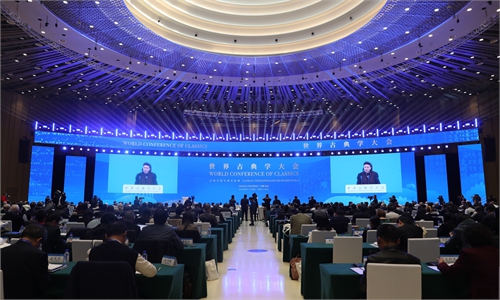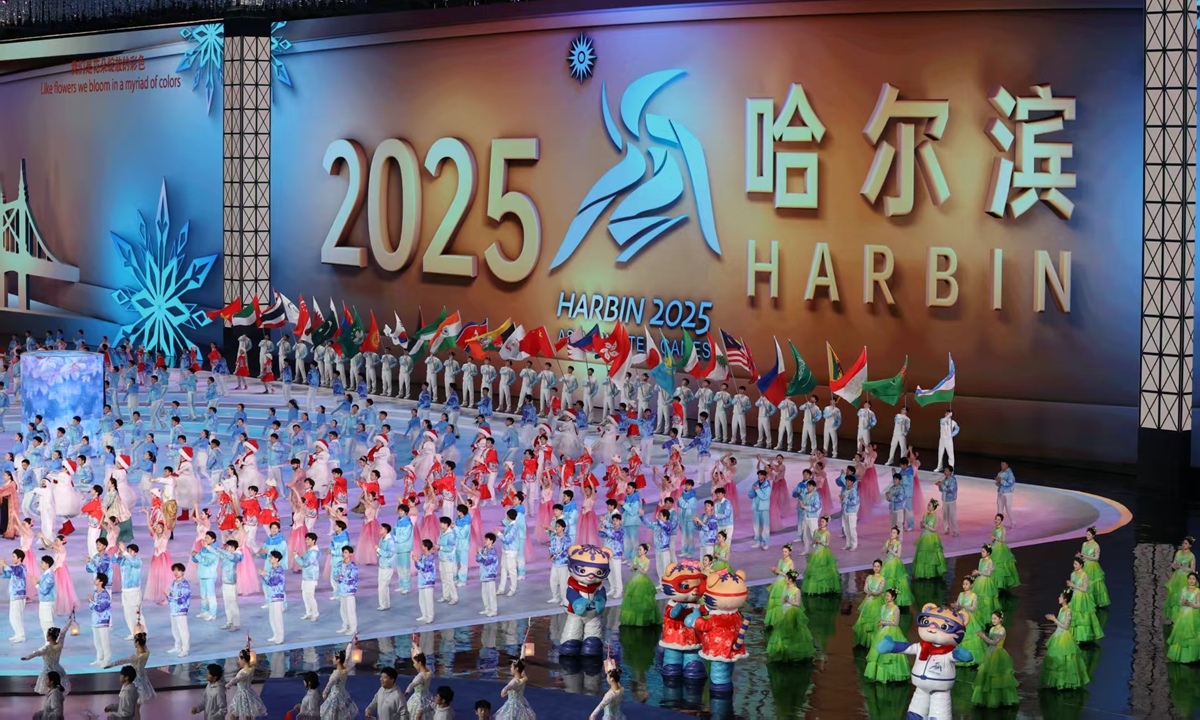
DeepSeek Photo: VCG
While the artificial intelligent (AI) model developed by Chinese tech start-up DeepSeek has stunned the tech world, the company's breakthrough - a demonstration of China's innovation strength - has also triggered a buying spree among global financial institutions and hedge funds of Chinese equities.To date, the benchmark Hang Seng Tech index has entered a bull market, rising more than 30 percent in the past month. Also in just the past month, China's onshore and offshore equity markets have added more than $1.3 trillion in total value, according to a Bloomberg report.
The sweeping momentum highlights how the recent AI-driven development has been serving as a catalyst for global capitals to broadly reappraise Chinese assets, which have been largely undervalued in the past few years, analysts said, while expecting that foreign investors' confidence on Chinese equities will be further lifted up in the long-term along with tech-fueled industrial upgrade, more economic supportive measures as well as a robust economic growth streak.
According to the Bloomberg report on Sunday, hedge funds have been "piling into Chinese equities at the fastest pace in months," while another emerging market, India, in contrast is suffering a record exodus of cash, with market valuation shrinking by more than $720 billion in the past month.
The MSCI China Index is on track to outperform its Indian counterpart for a third-straight month, the longest such streak in two years, the report said.
The bullish sentiment has led to an extended Chinese tech stock rally across the board.
As of Friday's closing, Nasdaq-listed Chinese tech stocks have gained by approximately 24 percent since the beginning of the year, news website 21jingji.com reported. In A-share market, the price of AI-related equities in the Shanghai and Shenzhen bourses also skyrocketed, with a batch of them surging by over 50 percent since trading reopened in early February.
"DeepSeek's surging popularity has offered a window of investment opportunities for foreign capitals, which has once again placed the limelight into Chinese tech industries and the broader Chinese assets," Wang Peng, an associate research fellow at the Beijing Academy of Social Sciences, told the Global Times on Sunday.
Integrating with real economy
China's leading social media platform WeChat confirmed with the Global Times on Sunday that it is conducting small-scale testing to integrate DeepSeek's R1 large model. It added that multiple Tencent products, including Tencent Cloud's AI code assistant, are exploring integration with DeepSeek to offer users a richer experience and enhanced services.
In addition, multiple Chinese sectors, ranging from automakers, internet companies and industrial manufacturers to information service providers, have been integrating DeepSeek's large language models (LLMs) for enhanced AI capabilities.
Dong Shaopeng, a senior research fellow at the Chongyang Institute for Financial Studies at Renmin University of China, told the Global Times on Sunday that this adaption signals a "critical historical phase" for China's AI models.
There used to be some pessimist narratives surrounding China's homegrown tech innovations, but the stunning debut of DeepSeek marked a "watershed," an equity fund manager based in Shenzhen, South China's Guangdong Province, who prefers not to be identified, told the Global Times on Sunday.
Analysts said the DeepSeek-triggered Chinese equities rally would not be a short-term speculative frenzy, but instead will be a "strategic repositioning" and a "long-term" bullish run" that not only takes into account the country's cutting-edge technologies, but also a package of pro-growth policies and sound economic fundamentals.
Kuang Zheng, chief investment officer for HSBC Global Private Banking and Wealth in China, said that DeepSeek's success could serve as a catalyst for further technological innovation among China's private enterprises, potentially leading to more groundbreaking advancements in the tech sector and boosting investor confidence in the Chinese stock market, according to a Beijing Daily report.
Yang Delong, chief economist at Shenzhen-based First Seafront Fund, told the Global Times over the weekend that he believes that Chinese companies' significant advantages in the AI software sector will give it a competitive edge in AI applications. And with the world's largest consumer market, China is poised to drive the global industrial shift from hardware infrastructure to software services.
"Chinese tech sectors like AI, big data, and internet technologies are set to profoundly transform the country's asset structure. This transformation will optimize and drive growth in traditional industries, offering an extended boost to the Chinese real economy," Dong said, noting that is one of the primary reasons that Chinese assets have been captivating foreign investors in recent days.
A number of foreign financial institutions and equity funds have issued upbeat calls on Chinese equities since late January.
"It would seem that we are less than halfway through the rally" driven by DeepSeek, UBS strategists including James Wang wrote in a note released in February, according to a Bloomberg report in February 12.
Ample liquidity and lower interest rates should help AI-related names to further re-rate, they added.
"We think 2025 is the year the investing world realizes China is outcompeting the rest of the world," Deutsche Bank said in a February report entitled "China Eats the World" that went viral on Chinese social media platforms, according to a report by the South China Morning Post in early February.
JPMorgan strategists including Rajiv Batra noted that fund flows into Chinese internet names have been positive this year, with a surge following the DeepSeek shock, according to the Bloomberg report on February 12. "We see a window of opportunity in Asia over the coming months, with another tactical rally in China driving upside," they were quoted as saying in the report.
Leading US bank Goldman Sachs forecast potential gains of 14 percent year-on-year for the MSCI China index by the end of 2025 in its base case, while up to 28 percent in its bull case outlook, according to a research report published by Goldman Sachs in early February.
RELATED ARTICLES








